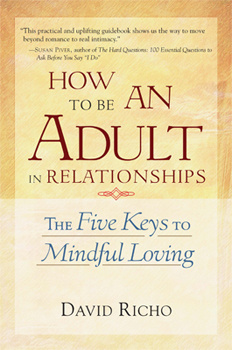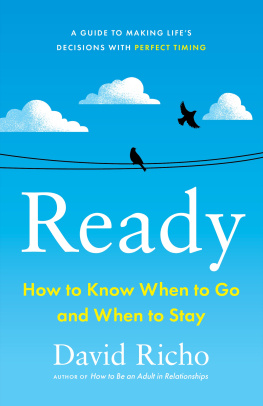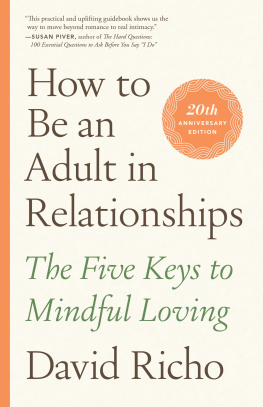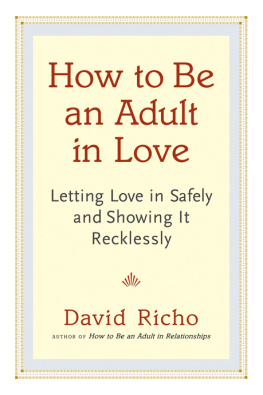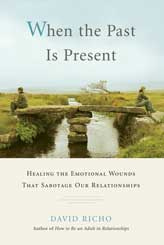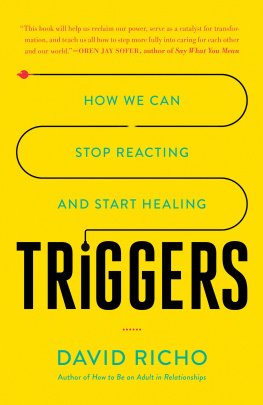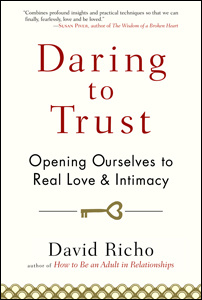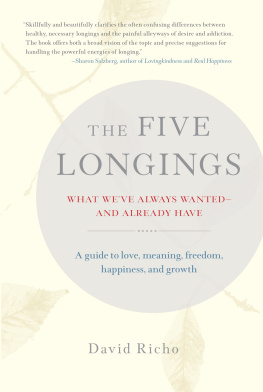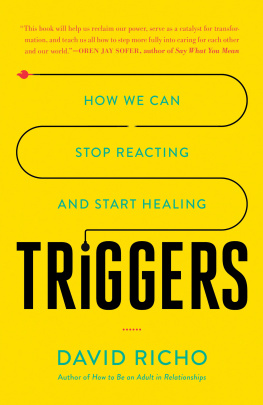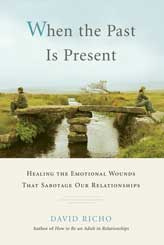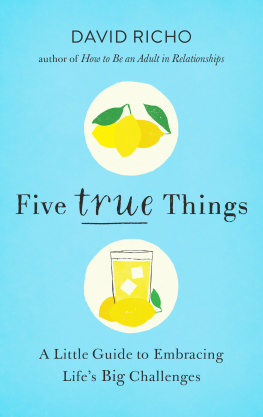A lucid, thought-provoking, and illuminating book about the realities of human existencea wonderfully useful guide to fluid acceptance of life as it is.
Martha Beck, author of Finding Your Own North Star and The Joy Diet
I started highlighting splendid passages in this book and my highlighter ran dry. The whole book is splendid.
Brother David Steindl-Rast
ABOUT THE BOOK
Why is it that despite our best efforts, many of us remain fundamentally unhappy and unfulfilled in our lives? In this provocative and inspiring book, David Richo distills thirty years of experience as a therapist to explain the underlying roots of unhappinessand the surprising secret to finding freedom and fulfillment.
There are certain facts of life that we cannot changethe unavoidable givens of human existence: (1) everything changes and ends, (2) things do not always go according to plan, (3) life is not always fair, (4) pain is a part of life, and (5) people are not loving and loyal all the time. Richo shows us that by dropping our deep-seated resistance to these givens, we can find liberation and discover the true richness that life has to offer. Blending Western psychology and Eastern spirituality, including practical exercises, Richo shows us how to open up to our livesincluding to what is frightening, painful, or disappointingand discover our greatest gifts.
DAVID RICHO, PhD, is a psychotherapist, teacher, writer, and workshop leader whose work emphasizes the benefits of mindfulness and loving-kindness in personal growth and emotional well-being. He is the author of numerous books, including How to Be an Adult in Relationships and The Five Things We Cannot Change. He lives in Santa Barbara and San Francisco, California.
Sign up to learn more about our books and receive special offers from Shambhala Publications.

Or visit us online to sign up at shambhala.com/eshambhala.
SHAMBHALA PUBLICATIONS, INC.
Horticultural Hall
300 Massachusetts Avenue
Boston, Massachusetts 02115
www.shambhala.com
2005 by David Richo
All rights reserved. No part of this book may be reproduced in any form or by any means, electronic or mechanical, including photocopying, recording, or by any information storage and retrieval system, without permission in writing from the publisher.
Library of Congress Cataloging-in-Publication Data
Richo, David, 1940
The five things we cannot change: and the happiness we find by embracing them / David Richo.1st ed.
p. cm.
eISBN 978-0-8348-2226-9
ISBN 1-59030-209-5
1. Conduct of life. I. Title.
BF637.C5R535 2005
158dc22
2004016055

For my wonderfully
lovable nephews and niece,
Christian, Damien, and Thea
And in tender loving
memory of my sisters
Gail and Linda

CONTENTS
PART ONE
THE GIVENS OF LIFE
PART TWO
AN UNCONDITIONAL YES
TO OUR CONDITIONED EXISTENCE
INTRODUCTION
T HERE ARE some things in life over which we have no control, probably most things. We discover in the course of our lives that reality refuses to bow to our commands. Another force, sometimes with a sense of humor, usually comes into play with different plans. We are forced to let go when we want so much to hold on, and to hold on when we want so much to let go. Our livesall our livesinclude unexpected twists, unwanted endings, and challenges of every puzzling kind.
Reinhold Niebuhr, an American Protestant theologian, composed a prayer that has become the cornerstone of the recovery movement: God grant me the serenity to accept the things I cannot change, the courage to change the things I can, and the wisdom to know the difference. This is a profound aspiration. But what are the things we cannot change? Are they unique to each of us, or are there some things that all of us must acknowledge and accept in order to find peace in our lives?
As a psychotherapist working with clientsand in my own lifeI have seen the same questions and struggles arise again and again. There are five unavoidable givens, five immutable facts that come to visit all of us many times over:
1. Everything changes and ends.
2. Things do not always go according to plan.
3. Life is not always fair.
4. Pain is part of life.
5. People are not loving and loyal all the time.
These are the core challenges that we all face. But too often we live in denial of these facts. We behave as if somehow these givens arent always in effect, or not applicable to all of us. But when we oppose these five basic truths we resist reality, and life then becomes an endless series of disappointments, frustrations, and sorrows.
In this book, I propose the somewhat radical idea that the five givens are not actually the bad news that they appear to be. In reality, our fear of and struggle against the givens are the real sources of our troubles. Once we learn to accept and embrace these fundamental, down-to-earth facts, we come to realize that they are exactly what we need to gain courage, compassion, and wisdomin short, to find real happiness.
A given is a fact of life over which we are powerless. It is something we cannot change, something built into the very nature of things. From one point of view, there are many givens. In addition to the five disturbing givens stated above, there are also delightful givens: we experience bliss, our hopes are sometimes exceeded, we discover unique inner gifts, things have a way of working out, luck comes our way, miracles of healing happen.
There are also givens that apply only to us as individuals: our body shape and personality, our unique psychological and spiritual gifts or limitations, our temperament, our genetic makeup, our IQ, our conventional or unconventional lifestyle, whether we are introverted or extraverted, and so forth.
There are in fact, givens in every thing we do and in every place we enter. A given of having a job is that we might advance or we might be firedas well as any number of possibilities between. A given of a relationship is that it may last a lifetime or it may end with the next phone call.
I have found that anything that crosses swords with our entitled ego is a powerful source of transformation and inner evolution. The five simple facts of life defy and terrorize the mighty ego that insists on full control. Life happens to us in its own way, no matter how much we may protest or seek to dodge it. No one is or has ever been exempt from lifes uncompromising givens. If we cannot tolerate them, we add stress to our lives by fighting a losing game.
In this book I will explain why we need not feel despair in the face of the givens of our lives. We can learn to accept life on its own terms. We can even find its terms satisfactory. We do not have to shake our fist at heaven. We do not have to demand an exemption or take refuge in a belief system that muffles the wallop of the givens by promising a paradise without them. We can craft a sane and authentic life by saying yes to life just as it is. Indeed, our path is what is.
The story of Buddhas enlightenment illustrates that the givens of life are the basis of our growth and transformation. The Buddha was born Siddhartha Gautama, an Indian prince. His father tried to protect him from encountering pain or displeasure. The king created a life of utter perfection for Siddhartha, providing him every possible satisfaction and shielding him from all unpleasantness. But one day the young prince wanted to see what lay beyond the palace walls. When he ventured out, he soon encountered sickness, old age, and deaththe natural conditions of every lifefor the first time. These sights moved him deeply and set him on a spiritual journey that ultimately led to his enlightenment. His legendary transformation began by facing the laws of life with curiosity and courage.
Next page
